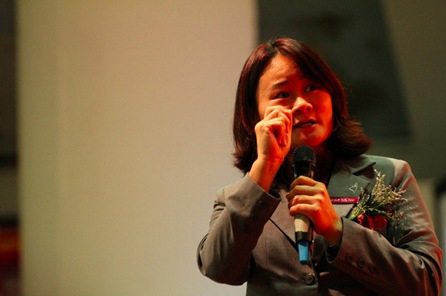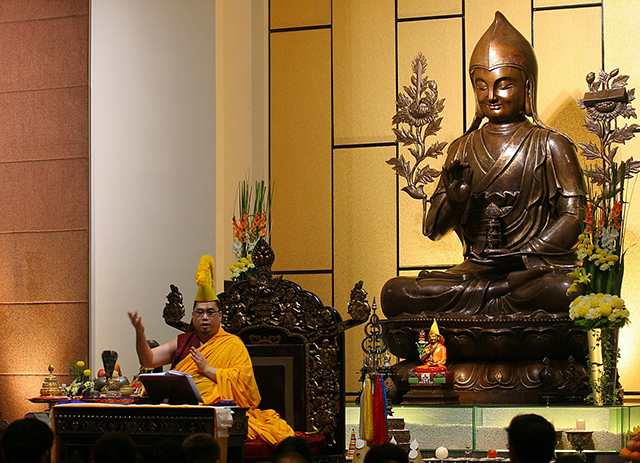The responsibility of a good answer
March 12, 2014 0
My Facebook Fanpage profile says I am Kechara’s youngest pastor and sangha-to-be, and sometimes that makes me a little anxious because it paints a certain image of me in some people’s minds. I am supposed to be young (and not totally uncool, I would like to think! Hehe) but I am also supposed to have enough knowledge to provide spiritual and secular support. Even in my “downtime”, there’s an expectation that my behavior is befitting that of an ordained person. So perhaps it is my age that invites people to ask me all kinds of questions and to make requests of me which I never mind answering or trying to fulfil. Usually they are requests or questions they can’t ask someone older because it will be harder to put the wool over the eyes of someone more experienced.

People like Pastor Yek Yee will always work tirelessly to benefit others. But when they speak, which of the three cups are you – the cracked cup, the upturned cup or the stained cup?
So back to the issue of my age and the questions I am asked – how does one advise people who are going through family break-ups, relationship problems, death and illness? Let’s discount self-doubt from this discussion. The self-doubt of not knowing enough, worrying I’m too young to have a valid opinion or provide valid advice, or concerned that I might give the wrong advice and it totally backfires on the individual.
What I am addressing is the reaction of the recipient which arises from the fact their questions are usually highly personal in nature. Situations like those are highly personal because of two factors –
- you’re advising people on their lives and the decisions they have made and are making. People take that kind of thing very seriously; any perceived criticism is taken as a slight / attack to their very being
- people are asking for advice from a spiritual point-of-view, and spirituality is a deeply personal thing
The “trouble” arises because the advice is received by people who generally have not made spirituality an intrinsic part of their lives, such that they approach ALL of their decisions from a spiritual point-of-view. So when things go wrong, when the advice does not work, it is not something they want to hear or they don’t get their results quickly enough, the advisor gets blamed.
The advisor is blamed because the receiver does not understand (or want to accept) that their problems arise from karma accumulated from countless previous lifetimes, and oftentimes it’s going to take more than a couple of weeks to resolve everything. They also don’t understand that it is probably that same attitude that got them into trouble in the first place and to fix the problem, they will have to fix their attitude or perspective. So it really isn’t as simple as “say three Hail Mary’s” – you worked to create your problems, so there’s work involved in getting yourself out of them.
But blaming isn’t the real issue here. The real issue is the person’s resulting bad view of the faith. The “oh, Buddhism is fake, it’s not powerful” or “I thought it can help me but it can’t, I hate religion” type of reactions. Rinpoche has said in the past that for many people, they only have one chance in this lifetime to connect with spirituality, whether it is Buddhism, Christianity, Islam, Hinduism, Judaism. When a person practices their faith with full conviction, knowledge and understanding, it can do a lot to turn their current and future lives around. So it is a very heavy responsibility for advisors to bear when a question is asked of them – that answer, no matter how simple or benign it appears to be, can lead either to their deepening faith or their distrust of religion. That is the real responsibility an advisor bears, if they are doing their job right.
Are you ready to take on the responsibility of a person’s spiritual journey in this life and future lives? Dramatic perhaps, but that is what it boils down to. Because think of all the times you asked someone a question, didn’t like the answer then decided you didn’t want to be around that person anymore.

Whether the teacher is on the throne or off the throne, the responsibility of the advice and teachings he / she gives you is a very heavy one
I know this is something all REAL teachers face, and the problems and questions posed to people like Rinpoche greatly outweigh those posed to me. This post is by no means a complaint; I just wanted to give everyone a little insight into some of the difficulties an advisor faces when you ask them a question, whether it is your guru, a counsellor, therapist or just a friend. They will always answer you, based out of their love for you or obligation to you, but the prevailing expectations for a quick-fix adds a lot of extra pressure to them.
Does this mean you shouldn’t ask your question? No, by all means ask away; when you need help, you need help. However when you do, receive the advice with an open mind. If you trust a person enough to ask them your most personal questions, trust them enough to know their advice (however difficult it is to listen to) is coming from a good place. What about that uncomfortable feeling you get when you hear their words? That’s the ego talking – ignore it because it’s what got you into trouble in the first place. Think about why their advice is upsetting you. Is it because it’s the truth you didn’t want to hear? Something you knew all along and now that someone has verbalised it, you can’t escape it? Is it your laziness talking, of not wanting to actually work to fix it? Is it your pride that is hurt having to acknowledge you caused the problem to begin with? Is it a feeling of helplessness that nothing that can be done to fix your problem? Is it because the person is genuinely out to get you with their harsh advice?
And will there be people who steer you wrong? Of course and I refer you to the story of Angulimala’s first guru when I say this. But that’s why examining your teacher (before you accept them as such) is so very important and once you’ve accepted them, go all the way with it. Rinpoche has many teachings on the importance of a spiritual master, and how we examine teachers before accepting them fully and totally – you might want to pick up a copy of Gurus for Hire, Enlightenment for Sale to get a little more insight into this.
At the end of the day, the advisor can only tell you so much. What you are today, is the result of your actions yesterday. And if your past actions caused you so many problems today, what are you doing today to make sure you have a better, different future? Many things to think about, I’ll leave you in peace for now 🙂
Recent Posts
Subscribe to Blog
Categories
Archives
Visitors by Country
| Total Pageviews: | 1 |
|---|



Leave a Reply